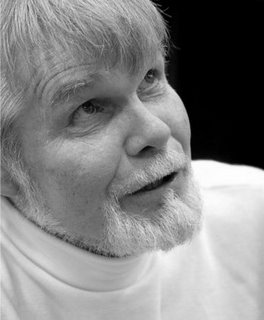George Lutz Former Owner Of Amityville Horror House Dies

Former owner of Amityville horror house dies in Las Vegas
http://www.lasvegassun.com/sunbin/stories/nevada/2006/may/10/051010103.html
ASSOCIATED PRESS
LAS VEGAS (AP) - George "Lee" Lutz, whose brief stay in an Amityville, N.Y., home spawned one of the most famous haunted house stories ever, has died of natural causes. He was 59.
Lutz, a Las Vegas resident, died Monday, his lawyer, Larry Zerner of Los Angeles, confirmed Wednesday.
The Clark County coroner listed Lutz' cause of the death as heart disease.
Lutz, a former land surveyor, became famous after moving his new bride, Kathy, and three children into a three-story Dutch colonial on Long Island in 1975, about a year after six members of the DeFeo family had been shot and killed in the home. Ronald DeFeo Jr., the eldest son, was convicted of the murders.
The Lutzes lived in the home for 28 days before being driven out by the spirits of the DeFeos, according to Lutz' account.
The family's tales of eerie feelings and waking dead became the source for Jay Anson's 1977 book, "The Amityville Horror," along with a 1979 film of the same title and a 2005 movie remake.
The book and movies chronicled the Lutz family's horrors in suburbia, including visions of walls oozing slime, moving furniture, a visit from a demonic pig named Jodie and spontaneous levitation.
The franchise made a cult figure out of Lutz, who some claimed bore a creepy resemblance to the killer. But it never made him rich. Lutz claimed to have made only $300,000 off the tale.
Almost immediately after telling it, Lutz' story was challenged by some who accused him of trying to profit from the DeFeo murders.
In 1979, shortly before the film's release, William Weber, DeFeo Jr.'s lawyer, told The Associated Press that he, along with Kathy and George Lutz, had invented parts of the best-selling story "over many bottles of wine."
"We were really playing with each other. We were creating something the public would want to hear about," Weber said, claiming that he supplied the Lutzes with background on the DeFeo murders to weave into their ghost stories.
Lutz denied the allegations.
The Amityville tale and the rights to profit from it quickly led to a tangle of litigation involving the Lutzes, Weber, publishers, Anson and others.
After fleeing the home and abandoning their possessions, the Lutzes moved to San Diego, briefly selling Amway products to make a living. Eventually they moved to Arizona, where the Lutzes divorced. Kathy Lutz, who was active in a Christian ministry, died in 2004 of a respiratory disease.
Lutz, called "Lee" by his friends, moved to Las Vegas in the late 1980s, said Dan Farrands, a Los Angeles filmmaker who befriended him six years ago while making a documentary about the Amityville murders for the History Channel.
Farrands said Lutz was active in his Catholic church, volunteered at a homeless shelter and spent his time restoring old cars. Lutz was a lighthearted, Farrands said, until the subject of Amityville came up, "and then he'd turn sort of blank."
"It was a subject that was very troubling for him," Farrands said, adding that Lutz always believed he had witnessed the supernatural in that home.
"It was not that everything that had ever been said about that story was true, it had become a piece of Hollywood merchandise, it became larger than life. But, for him, that never took away from the fact that his family was scared away from their home," Farrands said.
"People are disrespecting a true story," Lutz told People Magazine last year. "It's my family's story, and it's hurtful."
Lutz is survived by his longtime girlfriend Cindy Stock, of Las Vegas, and his five children: Christopher, Daniel, Melissa, Gabrielle and Noel.
A private memorial service is planned, Zerner said.









